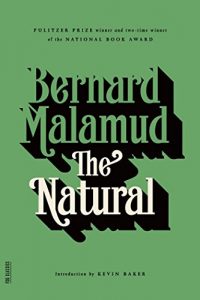 There are, to my knowledge, two good indicators of the enduring legacy of Bernard Malamud’s first novel, The Natural. The first came in 1984, when it was adapted into a Hollywood film starring Robert Redford that still ranks among the best sports films ever made. The second came in 1992, when the plot of an entire episode of The Simpsons made extensive reference to the book and the movie based on it. The Natural revolves around the life of Roy Hobbs, a young baseball prodigy who is traveling by train to Chicago for a tryout with the Cubs. He is accompanied by his manager, Sam, an alcoholic who is hoping his discovery of Roy will rejuvenate his career.
There are, to my knowledge, two good indicators of the enduring legacy of Bernard Malamud’s first novel, The Natural. The first came in 1984, when it was adapted into a Hollywood film starring Robert Redford that still ranks among the best sports films ever made. The second came in 1992, when the plot of an entire episode of The Simpsons made extensive reference to the book and the movie based on it. The Natural revolves around the life of Roy Hobbs, a young baseball prodigy who is traveling by train to Chicago for a tryout with the Cubs. He is accompanied by his manager, Sam, an alcoholic who is hoping his discovery of Roy will rejuvenate his career.
Also on the train is Walter “The Whammer” Whambold, the American League’s leading hitter, and Harriet Bird, a young and beautiful college student who catches the attentions of both Roy and Walter. When the train makes a temporary stop at a carnival, Sam bets 10$, the only money he and Roy have, that Roy can strike Walter out, and the ensuing face off presents the first opportunity for Malamud to flex his prose. The contest begins from Roy’s perspective, as Roy takes the mound to face the fearsome batter: “Though he stood about sixty feet away, he loomed up gigantic to Roy, with the wood held like a caveman’s ax on his shoulder. His rocklike frame was motionless, his face impassive, unsmiling, dark.” But Malamud switches perspectives as the duel gets underway, favouring the batter’s viewpoint:
The ball appeared to the batter to be a slow spinning planet looming toward the earth. For a long light-year he waited for this globe to whirl into the orbit of his swing so he could bust it to smithereens that would settle with dust and dead leaves into some distant cosmos. At last the unseeing eye, maybe a fortuneteller’s lit crystal ball – anyway, a curious combination of circles – drifted within range of his weapon, or so he thought, because he lunged at it ferociously, twisting round like a top. He landed on both knees as the world floated by over his head and hit with a whup into the cave of Sam’s glove.
The ball that begins as a planet becomes, as it passes the Whammer, “the world,” taking on greater meaning as it escapes him. Now it is Roy who assumes gladiator-like dimensions, appearing to the Whammer, as he awaits the final pitch, “like a veteran undertaker of the diamond.”
The third ball slithered at the batter like a meteor, the flame swallowing itself. He lifted his club to crush it into a universe of sparks but the heavy wood dragged, and though he willed to destroy the sound he heard a gong bong and realized with sadness that the ball he had expected to hit had long since been part of the past; and though Max could not cough the fatal word out of his throat, the Whammer understood he was, in the truest sense of it, out.
It is a common trope in sports writing for a simple confrontation to take on greater, world-encompassing meaning, as it is for an underdog to humble the expected champion, but Malamud is merely toying with his reader, for a few short pages later Roy finds himself alone in Harriet Bird’s hotel room, expecting to enjoy the rewards of the victor, when instead she pulls out a gun and shoots him in the stomach.
When the novel resumes, more than a decade has passed. Roy has recovered from his attempted murder, but he has never fulfilled his baseball ambitions, and in his early 30s he makes a bid to join a fictional professional team, the New York Knights, who for some years have languished from incompetent management. Roy’s personal quest for redemption, his ambition to break every baseball record, becomes intertwined with the fate of the team, and it is here that Malamud’s novel takes on mythological dimensions, with Roy cast as the knight Percival in the Arthurian legend of the Fisher King: Roy’s team, the Knights, is coached by Pop Fisher, and Roy’s name is derived from the Latin roots of the words “king” and “horse,” associating him with the knight Percival, upon whose shoulders the fate of the kingdom rests. These are the high stakes Malamud establishes in the most ambitious of sports novels.